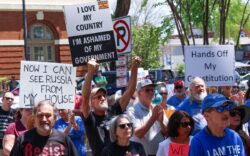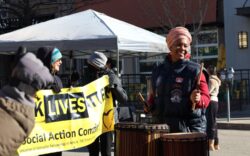All eyes are on Georgia elections this year—from the New York Times and Washington Post to party-appointed poll watchers to ordinary citizens wanting to make sure their votes will count. Much of the drama has centered on the newly reorganized Georgia State Election Board, where Trump-supporting appointees have defied Georgia’s secretary of state, attorney general and other officials by introducing rule changes that critics say could delay certification of election results and sow disorder. On top of that, more than 10 lawsuits have been filed in 2024, challenging various aspects of the state’s election process and alleging that counties’ voter rolls are filled with ineligible names.
Athens-Clarke County’s election workers are ready for what some consider the election of a lifetime. More than 200 have been hired to work the polls on Nov. 5, with 55 of them working during advance voting Oct. 15–Nov. 1.
Turnout is expected to be high. Charlotte Sosebee, ACC’s director of elections and voter registration, says that excitement around this election is among the highest she has seen in her thirty-plus years working in elections and voter registration. “Maybe it’s because it’s Georgia and people know it will play a major factor in who wins or loses,” she says. The first day of advance voting broke records across the state, including in Athens-Clarke County, where more than twice as many people voted as on the first day of voting for the 2020 general election.
ACC is in experienced hands. In September, Sosebee was one of two inductees into the National Association of Election Officials’ Hall of Fame at the organization’s annual conference in Detroit. Other ACC elections staff members received a People’s Choice award for a paper they presented on the Election Night process. “Athens-Clarke County is known in the United States,” Sosebee says with pride.
“I feel like we’ve got this,” she says of the 2024 election.
Gearing Up
As county residents anxiously read and hear of challenges to voter registration, staffers at the downtown elections office field many calls from people wanting to confirm their registration. The elections office maintains voter rolls year-round, removing people who have moved, been convicted of felonies or died. In September, workers began testing the voting machines, among other preparations for the upcoming vote. Now the office is processing absentee and overseas and military votes as they come in.
Sosebee and other ACC officials were surprised in September when ACC was named as one of eight Georgia counties whose election boards are being investigated by the State Election Board for allegedly refusing challenges to voter registrations. In December 2020, the ACC Board of Elections received a list of almost 5,000 potential challenges from Texas-based conservative group True the Vote, but at that time, that type of mass challenge was not allowed under Georgia law. Sosebee says that, since then, there have been just two challenges, each focused on an individual voter’s registration. In both cases, investigations and hearings took place, and the challenges were ruled valid. No challenges have been refused.

All of Sosebee and her colleagues’ activities are guided by Georgia Code Title 21, a tome of hundreds of pages to which Sosebee has added colored, labeled bookmarks. “It’s my work bible,” she says with a laugh. “I write it upon the tablet of my heart. It is a lamp unto my feet.”
As elections director, she must know the law’s intricacies inside and out. At the other end of the spectrum, Election Day “runners” who help transport materials need only understand fundamentals, especially from the section Sosebee calls the “DO NOTS”: DO NOT alter or destroy ballots, intimidate voters, accept or receive gifts, and so on.
Even experienced poll workers must go through training for every election cycle. At poll manager training sessions, trainees learn about election law, emergency preparedness and customer service best practices. They roleplay de-escalating conflicts and do a scavenger hunt through a simulated polling place looking for problems, such as confusing signage and unattended ballot cards.
Role playing can be a chance for humor, even though poll managers take their work very seriously. “You’re going to put my ballot in a shredder,” one manager repeatedly insisted (in character) at a training earlier this year, while another calmly explained that all votes are counted. Some poll managers also train in first-aid and CPR; some election workers learn to administer Narcan.
Mark Brown, a recently retired professor of entomology at UGA and an election worker since 2020, says that as a scientist he appreciates how comprehensively the rules and regulations for any given situation are laid out, step by step. “From the get-go, I have been impressed by how the folks who are in the elections office try to organize it and make it as instructive and as easy as it can be,” he says.
Chuck Horne, who is now retired from a career in IT, says that becoming a poll worker has made him much more confident in Georgia’s election security. While theoretically technology could be tampered with, when he saw all the protocols and understood how many different individuals, precincts and even counties would have to coordinate with each other for widespread fraud to occur, he came to see the process as trustworthy.

Many people see election work as a way to give back. Mother and daughter Alva and Alicia Rawles initially assumed election workers were unpaid volunteers, but were still eager to help out. Now Alicia is an experienced poll manager and Alva works in the elections office processing absentee ballots. The Rawleses are one of several family groups or couples who work elections together. “I’m very proud that she wants to do this, and she’s good at it,” Alva says of her daughter. In turn, Alicia hopes her adult son will get involved in elections one day, too, though his work schedule makes that tough.
The Big Day and Beyond
On Election Day, precinct managers will begin calling the office at 6 a.m. as they confirm their arrival and report any issues. Poll workers prep the areas the day before, setting up tables and chairs and stanchions to direct traffic, but that morning they will attend to final details, place “Vote Here” signs outside, don their red aprons and get sworn in. ACC will have 24 polling locations on Nov. 5, with residents casting votes at schools, churches, a fire station, the tennis center and even the Athens-Ben Epps airport.
Before the election, the poll pads are programmed with voter registration information and all possible combinations of races, since voters in the same precinct may be assigned to different districts for state legislature, county commission, school board or other races. When a voter checks in, their combination is transferred to a ballot card so that they will see only the relevant races. Their name will not be associated with their choices, though the system will record that they received a ballot card. If the poll worker sees that someone has been sent an absentee ballot but has not returned it, the voter must sign an affidavit promising not to vote twice. When absentee ballots are tabulated, officials will confirm that those voters did not vote more than once.
The pervasive harassment and threats that Fulton County election workers Shaye Moss and Ruby Freeman received when conspiracy theorists targeted them after the 2020 election casts a shadow over Georgia elections, but so far no serious incidents have occurred in Athens-Clarke County. Sometimes voters become disgruntled, but election workers have been able to defuse the situation. Still, workers remain on alert, given the intensity of rhetoric around the election.
On Election Day, local law enforcement will also be on call. “In past significant elections, all officers and staff were placed on standby,” ACCPD public information officer Lt. Jody Thompson wrote in an emailed statement. “In addition, the downtown units were staffed with extra officers.” He says the same protocol will be followed this year. “We don’t expect any issues, but we are ready just in case.”
If the State Election Board’s new rules are upheld, poll workers will remain at their precincts after voting ends on Election Night to hand count the paper ballots, while “runners” will return the memory cards to a secure location for results to be counted. However, Fulton County Superior Court Judge Robert McBurney has blocked the rule from taking effect, ruling that it came too late to properly train poll workers.
Georgia law requires counties to certify election results one week after Election Day, but another controversial new rule by the State Election Board requires counties’ election boards to conduct a “reasonable inquiry” into the results before certifying them. In part because the board did not define what constitutes reasonable inquiry, many on both sides of the aisle have raised concerns that counties’ board members could use the rule as a pretext to refuse or delay certification if their preferred candidate does not win.
Opposition by election board members in various Georgia counties in recent years has not succeeded in stopping results from being certified, but only because enough other board members voted to certify. In a separate case, McBurney also ruled that election boards must certify elections. “If election superintendents were, as plaintiff urges, free to play investigator, prosecutor, jury, and judge and so—because of a unilateral determination of error or fraud—refuse to certify election results, Georgia voters would be silenced,” the judge wrote.
In addition, Fulton County Superior Court Judge Thomas Cox struck down seven newly passed State Election Board rules, including the one requiring ballots to be hand-counted after polls close. Cox found that the board overstepped its legal authority in passing those rules.
At the ACC Board of Elections office in mid-October, workers seemed to be in good spirits. Sosebee says that during election season she stays grounded with the help of her family and of her church community, where she is a praise and worship director. She finds it deeply meaningful to help ensure each person can vote. Like other election workers, she looks forward to Election Night, when “I get home and I see the results, and I know I was a part of that.” But even if the election goes as smoothly as she hopes, she will not rest long—she is already thinking about the governor’s race two years from now.
Like what you just read? Support Flagpole by making a donation today. Every dollar you give helps fund our ongoing mission to provide Athens with quality, independent journalism.










